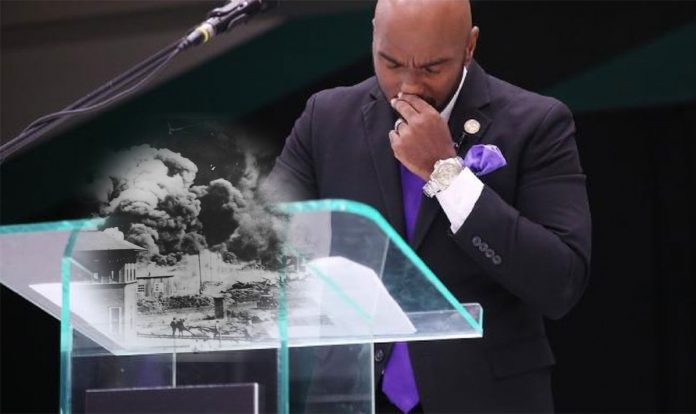Historians estimate as many as 300 black people were killed. Suit alleges massacre responsible for inequality in Tulsa today.
A group of Oklahomans, led by 105-year-old woman, filed a lawsuit on Tuesday demanding reparations for the 1921 Tulsa race massacre which saw white mobs burn down a thriving black neighborhood and kill hundreds of people.
The lawsuit alleges that the massacre, one of the worst acts of racial violence in US history, still overshadows the neighborhood of Greenwood, and that racial inequality in Tulsa today can be traced back to the events of almost 100 years ago.
An estimated 300 black people were killed on 31 May and 1 June 1921, after a white mob, backed by local authorities and police, destroyed 35 city blocks and displaced thousands of African Americans.
The massacre was brought into focus earlier this year when Donald Trump scheduled a campaign rally in Tulsa on Juneteenth, the commemoration of the ending of slavery in the US. After widespread condemnation, Trump moved the rally to the next day.
Historians estimate as many as
300 black people were killed
The lead plaintiff in the lawsuit is Lessie Benningfield Randle, 105, one of two known survivors of the massacre still alive.
Randle still experiences flashbacks of bodies stacked up on the street as the neighborhood burned, her attorneys said.
Other plaintiffs include the great-granddaughter of JB Stradford, who owned the Stradford hotel in Greenwood, the largest black-owned hotel in the United States at the time of the massacre, and grandchildren of people killed.
The lawsuit accuses the city of Tulsa, Tulsa county, the then serving sheriff of Tulsa county, the Oklahoma national guard and Tulsa regional chamber of being directly involved in the massacre.
The defendants, lawyers allege, have “unjustly enriched themselves at the expense of the black citizens of Tulsa and the survivors and descendants of the 1921 Tulsa race massacre”.
According to Human Rights Watch, 34% of black people live in poverty in Tulsa, compared with 13% of white people. Damario Solomon-Simmons, part of a team of attorneys who filed the lawsuit, said the events of 1921 contributed to problems that still exist in Tulsa.
“The Greenwood massacre deprived Black Tulsans of their sense of security, hard-won economic power and vibrant community,” Solomon-Simmons said.
“[It] created a nuisance that continues to this day. The nuisance has led to the devaluation of property in Greenwood and has resulted in significant racial disparities in every quality of life metric – life expectancy, health, unemployment, education level, and financial security.
“The defendants in this case have continued the massacre in slow motion for nearly a century.”
No one has been held accountable for the massacre.
In 2001, a commission formed by the state legislature found that the city had conspired with white citizens against black residents, and recommended direct payments to survivors and descendants.![]()
SOURCE ⇒ THEGUARDIAN
Consider supporting AMIBC™. Contribute by clicking on the advertisers and sponsors featured on AMIBC™ and please utilize them. Readers from around the world, like you, make our work possible. We need your support to deliver quality, vetted, investigative journalism – and to keep it open for everyone. At a time when factual, honest reporting is critical, your support is essential in protecting our editorial independence. The narratives and issues impacting all Americans is tantamount to the AMIBC™ platform. Every contribution, however big or small, is valuable for our future. Make sure to join the AMIBC Founders Club to maximize the total advantage of being a subscriber.




































